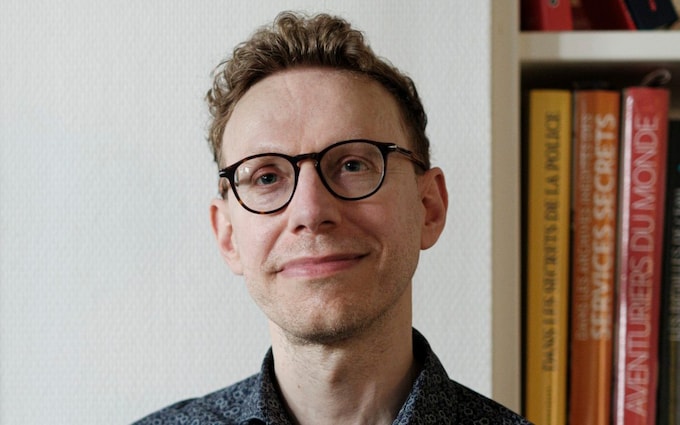
‘Autism made me feel like a foreigner growing up – the kids at school kept asking why I was weird’
Ahead of his new book, writer Daniel Tammet talks childhood, the rise of France’s Right and why he has a ‘lot of respect’ for JK Rowling

“People talk about autism saying it can cause problems with empathy,” says author Daniel Tammet. “But empathy should cut both ways. Neurotypical people also struggle to empathise with those who experience the world differently to them.”
Talking via video link from his cosy-looking home in Paris, the 45-year-old autistic writer smiles warmly as he tells me that his 10th book – Nine Minds: Inner Lives on the Spectrum – is his latest attempt to explode “the persistent, dehumanising clichés” that dismiss autistic people as somehow “blank, empty… robotic.”
In telling the fictionalised tales of nine real, well-known autistic people – from Canadian actor and screenwriter Dan Aykroyd to French mathematician and politician Cédric Villani – Tammet demolishes the autism myths that originated with medics around 90 years ago and migrated to the public imagination through simplistic portrayals in films such as Rain Man in 1988.

Like the character Dustin Hoffman played in the film, Tammet identifies as an “autistic savant”, a person who displays dazzling intellectual gifts but struggles with some aspects of social interaction.
He first hit the headlines in 2004 after setting the European record for reciting pi from memory, recounting to 22,514 digits in five hours and nine minutes – this caught the attention of Prof Simon Baron-Cohen who diagnosed Tammet with Asperger’s that year.
Tammet speaks 11 languages including Icelandic which he learned in a week. Unlike the caricatured “Rain Man”, Tammet now lives a full, adventurous and emotionally connected life: he’s been happily married (to French husband Jérôme, a photographer working for the French Ministry of culture) for 17 years and travels the world giving talks and engaging with readers.
His books about words and numbers are bursting with feeling and possibility. “I’m synesthetic,” he explains. “It means I experience many letters and numbers as colours. The number six…” he makes a face “is a lonely black hole for me.” But he also tells me that his husband’s name is ”yellow! Lovely!”
Born in 1979 to working-class parents in Barking, London, Tammet says that at that time there was “no public understanding of autism”. His parents were initially baffled by the unusual behaviour of their child but responded with nurturing intuition: “As a baby I cried constantly from oversensitivity to noise and light. My parents turned a blanket into a hammock and gently rocked me.”
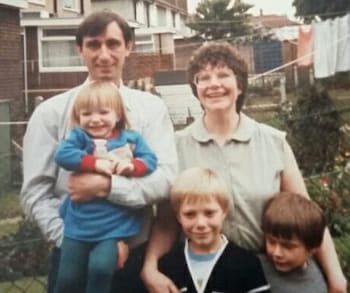
And as the eldest of nine, he benefited from the support of his siblings. “Early stimulation plays a vital role in helping people on the spectrum. As the oldest child I was surrounded by younger children who were admiring of my gifts, often had better social skills than I had, but were willing to engage me in games.”
He attended state schools where he says, “Teachers were largely understanding since I also had epileptic seizures and the medication made me doze in class. But sometimes a teacher would get angry if I didn’t understand a situation. That’s something I hope happens far less today.”
By the time Tammet reached secondary school, he was beginning to pick up prizes like “student of the year” but admits he found his peers less easy to read than his textbooks. “I got on better with the teachers than the other students,” he says. “My German teacher used to invite me to her house and in hindsight I realise that while I thought she was teaching me German, she was really helping me learn to converse in English.” What were his problems? “My sentences were too long and too bookish. I struggled with eye contact.”
Tammet also had some issues with coordination. “It took me ages to learn to tie my shoe laces,” he says. “And I was the last in my primary school to learn to swim.” A big grin. “Even now I don’t drive. I tried. I took my test twice. As you can imagine I had no problems with the theory test, but the practical test...? Not so good!”
Luckily for Tammet, he had parents willing to take him to the local library, where he devoured encyclopaedias and dictionaries before moving on to fiction. “Novels were my opportunity as an autistic child, to get into other people’s heads and grapple with complex emotions: joy, love, grief, ambition, despair and exhilaration.”
Real children though presented more of a challenge. “Every day the kids at school would say to me: We don’t understand you. Why are you so weird?” However, his London borough had a big immigrant population and children from those backgrounds were also struggling with mainstream culture. Tammet fell in with a more accepting crowd of “Iranians whose families had fled the revolution, and Pakistanis and Sikhs with their beautiful colourful turbans. They understood me because they also felt different. For them it was a visible difference for me, invisible. But we all felt the yearning to fit in.”
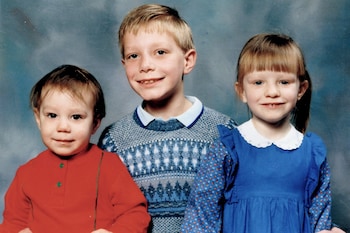
In addition he relished the sensory delights of the languages he heard his friends speaking: “I felt like a foreigner growing up because of my cognitive difference, and was fascinated when, around the age of nine, a Finnish woman became our neighbour. I identified strongly with this beautiful new language, even wondering if it were somehow my real mother tongue. Among the first Finnish words I learnt were the numbers and months of the year: January (the month I was born in) is tammikuu, which means month of the oak or “oak moon”. And so, as soon as I became an adult, I chose the surname ‘Tammet’.”
Despite his vertiginous IQ (150) and straight A and A star GCSE grades, Tammet points out that “the transition to adulthood can be particularly confusing and stressful for neurodivergent teenagers.” He “didn’t feel ready” to go to university at 18 and experienced “a period resembling a depression” in early adulthood, and instead waited until his 30s to get a degree – with first-class honours – in the Humanities from the Open University.
As Tammet became an adolescent he gradually realised he was gay. In that respect he found his autism an asset. “It was quite funny, quite lucky that I don’t really see taboos in that way. So when I realised I was gay that was just who I was.”
But he does ask himself if he would have found it so simple today. Now more autistic children are likely to identify as transgender than their neurotypical peers, and few studies have aimed to understand the inner experiences of this group. “That is something that needs to be looked at very seriously,” says Tammet. “I do wonder sometimes, had I been born later and presented with the differences that I had, including not being as masculine as other boys, would I have been drawn to a way of being that would have offered a sense of belonging?”
Tammet says he has “a lot of respect for JK Rowling because I think she is an incredibly brave voice. I’ve seen so much violence towards people who raise concerns as she has done. I wish it were possible to have a dialogue that was more respectful and sincere, where the voices could somehow hear each other.” Distressed by the “shouting on social media” he hopes that “telling stories will be the way forward.”
It was not until his mid-twenties that Tammet began to tell his own story. Aware that his cognitive differences made him stand out in the UK, he travelled to Lithuania to work as a volunteer teacher. “This was not long after Soviet tanks had been in the capital and you could feel the mark of that iron rule. Meeting the people there taught me a lot about courage and resilience.”
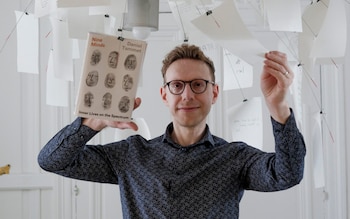
But for a long time he felt alone with his autism. In Nine Minds he describes seeing a social media post by one of his subjects – young British-Nigerian civil engineer and TV presenter Ayo Sokale – in 2020. Dressed in a black turtleneck Sokale looked into the camera and told viewers: “There is no one look for an autistic person. We don’t all look the same.”
The deep impact of Sokale’s “we” prompted him to track her down. Soon they were chatting via Zoom: a medium which he notes autistic people had been saying for years would facilitate home working – removing the stressors of office environments which hampered their productivity because for them it was easier than commuting. He discovered that not only was Sokale brave for what she posted on social media, but she had survived having a gun pointed at her head.
“Many of the people in my book were very brave, trusting me with the stories of their lives,” says Tammet. He highlights the 75-year-old Welsh hand surgeon who had a breakdown in his 20s, during which he lost the power of speech. “So many years until he got an autism diagnosis [in his 60s],” sighs Tammet. “And yet he healed so many people.…”
This surgeon – Vaughan Bowen – qualified at a time when the reading public were absorbing the ideas of autism popularised by British-born neurologist Oliver Sacks. In his bestselling book The Man Who Mistook his Wife For a Hat (1985), Sacks described autistic twins as “absurd little professors, peering and pointing, with a misplaced, obsessed and absurd concentration …like pantomime puppets”.
Tammet thinks the late Sacks was “a wonderful writer” but is upset by this portrayal of autism. He notes that people who knew the rock collecting, music-obsessive, original thinking Sacks well “have said to me he was almost certainly neurodivergent himself. But at the time he was writing – in the 1970s and 80s – it would have been unthinkable to put himself in the same category as the people he was portraying. I think he went into caricature to keep psychological distance between himself and his subjects.”
He believes that autistic people offer a brisk corrective to groupthink. While most world leaders bickered over short-term goals, it took an autistic child like Greta Thunberg to push for long-term global focus.
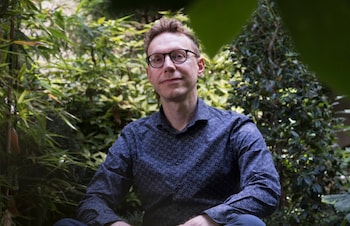
“When somebody like Cédric Villani – who has won the Fields Medal, awarded to talented mathematicians under 40 – went into politics he showed the hypocrisy of regular politicians,” says Tammet. “His honesty, simplicity and courage shone a light on those people who say they want change and then vote for the same old parties. If you approach a problem with a new way of thinking you’re more likely to find a solution than if you keep hitting your head against a wall.”
He notes that while neurotypical people are more oblivious to the patterns of history – suggesting this explains the “alarming” rise of the hard-Right in France – autistic people are more alert to the dangers of repeating mistakes.
“I am not saying autistic people are superior,” he stresses. Rather, he believes they offer a complementary worldview which could help keep humanity on an even keel if only we could listen. Tammet also has very little time for the idea that autism is being overdiagnosed these days. “I don’t think you’d find many scientists familiar with the subject to support that idea,” he says. “It’s simply that our understanding of neurodivergent behaviour is so much better now and we’re so much more attentive to cognitive differences in younger children.”
He sighs. “Twenty years ago only the most extreme forms of difference were being diagnosed. And that is where a word like ‘neurodivergent’ is so helpful. Otherwise the public picture somebody with autism who is completely cut-off, mute and unresponsive. That isn’t how most autistic people are at all. I think about 25 per cent are minimally verbal [they speak fewer than 30 or so words] so that means 75 per cent of us are verbal.“
One of the nine minds in Tammet’s book is that of a nonverbal autistic man called Billy. Although Billy is now in his 30s, Tammet goes back to his childhood to connect readers with a little boy who loved the cartoon of The Snowman. So it makes more sense when Billy later runs away from his family home dressed only in his pyjamas. We don’t see him as a naughty kid, but one charged by fictional adventure.
Tammet’s book reminds readers that back in the early twentieth century when European scientists first started to look into autism they saw it as an excess not a lack of imagination. Later medics would blame “refrigerator mothers” – assuming a lack of maternal nature was to blame for these kids’ ostensibly disengaged behaviour. Billy’s story operates as clear proof that autism is not the consequence of a lack of love and nor is a nonverbal life the prison some assume. Billy lives in the swirl of his own giddy adventure.
“For so many years my books were seen as niche writing,” says Tammet. “It’s been so difficult to be taken seriously as a writer. But I hope this book lands on shelves with the rest of contemporary literature. Because its themes can enhance anyone’s empathy”
Nine Minds: Inner Lives on the Spectrum, Profile Books, £20, is available to pre-order from The Telegraph Bookshop now